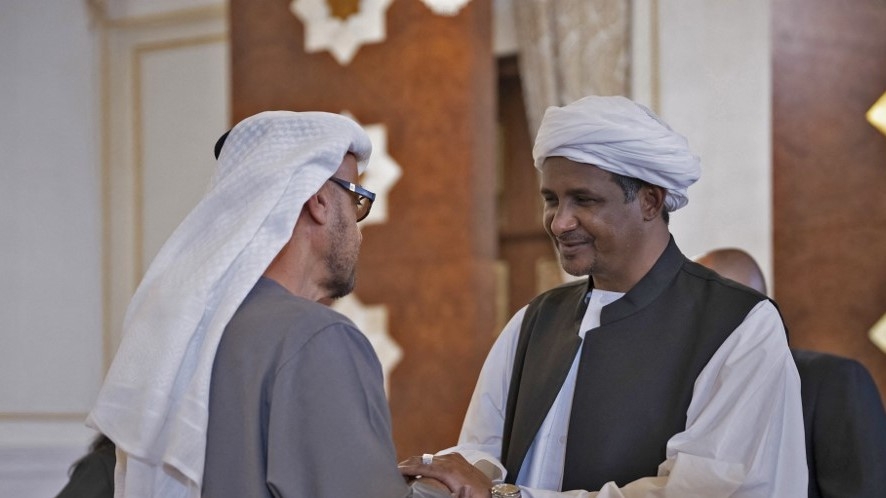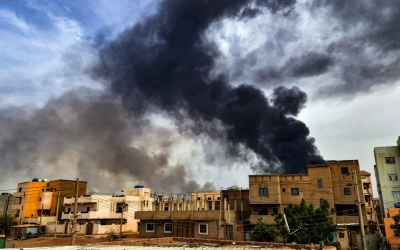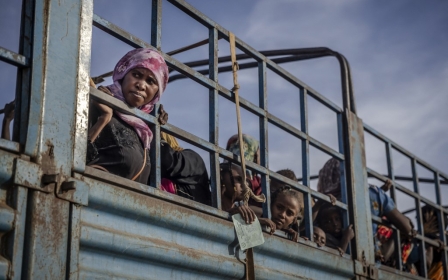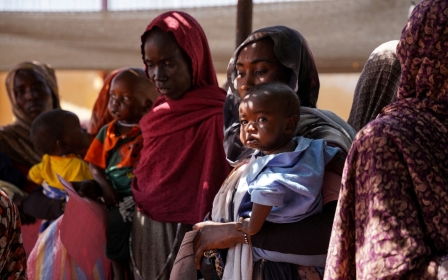How Sudan's RSF became a key ally for the UAE’s logistical and corporate interests

While the United Arab Emirates provided $70 million to UN agencies to address the humanitarian crisis unfolding in Sudan, growing evidence suggests that the Gulf state is also arming the Rapid Support Forces (RSF) in its deadly conflict with the Sudanese Armed Forces (SAF).
This support is closely linked to Abu Dhabi's interest in the African country’s vast agricultural and mineral resources, analysts say. It is ongoing despite the massive humanitarian toll on the Sudanese people, with over 750,000 at risk of starvation, at least 15,000 killed and more than 10.2 million displaced.
Experts and observers argue that part of the UAE's motivation for funding the devastating hostilities is to guarantee its access to Sudanese land, seaports, and mineral and agricultural resources, including livestock and crops.
“The RSF is the UAE’s hand in Sudan,” said Amgad Fareid Eltayeb, an analyst and former senior aide to Sudanese Prime Minister Abdalla Hamdok.
Eltayeb pointed out that the UAE seeks to maintain the RSF’s institutional presence in Sudan to ensure that its influence over Sudanese politics continues and its long-term investments in the country remain intact.
New MEE newsletter: Jerusalem Dispatch
Sign up to get the latest insights and analysis on Israel-Palestine, alongside Turkey Unpacked and other MEE newsletters
Gulf states’ agricultural investments in Sudan to address food insecurity date back to the 1970s. The UAE imports 90 percent of its food, as water is scarce and little of its land is arable.
According to Renee Vellve, co-founder of Grain, the UAE’s recent major agricultural investments in Sudan focus on animal feed (mainly alfalfa), crops and livestock.
Exports from Sudan to the UAE are difficult to quantify due to the prevalence of smuggling networks and illicit trade routes.
The UAE controls several land and farming operations in Sudan. International Holding Company (IHC), the UAE’s largest listed corporation, and Jenaan Investment are farming more than 50,000 hectares in Sudan. Abu Hamad’s farming project covers another 162,000 hectares of cultivated land.
Abu Hamad is a massive farming project led by IHC in partnership with Dal Group, Sudan’s largest private company. This project will link the agricultural area to a new Red Sea port, Abu Amama port, constructed and operated by AD Ports Group.
Sudan will be entitled to 35 percent of the seaport’s profits.
The Abu Amama port will allow the UAE to exert control over Sudan’s land and trade routes, playing a crucial role in its military, security and logistical strategies.
The UAE has invested an initial $6 billion in the project.
“If the UAE pours this amount of money, it needs to ensure that it will not go to waste,” said Abubakr Omer, a Sudanese expert in food systems and agriculture. “That involves having allies and solid partners on the ground”, he told MEE.
Resistance from locals
Emirati investments in Sudan, however, have consistently faced resistance from locals due to Abu Dhabi’s refusal to engage in mutually beneficial projects, said Eltayeb.
“The Emiratis preferred to loot the land’s wealth,” he said. “When they failed to land grab, they began to directly colonise, by using the RSF. This happened with the cover of impunity they have from the international community”, Eltayeb, who is currently a fellow with the European Council on Foreign Relations, added.
The United Kingdom has reportedly tried to suppress scrutiny of the UAE's role in Sudan. In June, a report from the Guardian reported that the Foreign, Commonwealth and Development Office (FCDO) pressured African diplomats not to criticise the UAE.
'What the UAE can get from the RSF is guarantees of gold and of future agricultural production'
- Abubakr Omer, expert
When the Emirati private sector negotiates investments, it deals with both the Sudanese private sector and local authorities. The RSF, known for its disregard for human rights, has become a “practical option” for foreign investors, Omer, a Sudanese expert, told MEE.
In the years leading up to the war, several Emirati attempts to negotiate agricultural deals in Sudan were rejected by the Sudanese government due to unfair conditions, another Sudan expert told MEE on condition of anonymity. These conditions entailed large profits for the UAE and little gains for local communities, highlighting the UAE’s extractive approach.
“The legitimacy of the Sudanese government has been declining in the past few years. Trust in the public sector’s implementation ability is low. One reason for the war is that the RSF machine got too big. The RSF reached a level of operations which go beyond those of the Sudanese government,” Omer said.
“What the UAE can get from the RSF is guarantees of gold and of future agricultural production. The RSF is an actor which has more power to deliver, as they have no regard for public relations or human rights,” he added.
The UAE’s strategy in Sudan is one of “land banking”, explained Alex de Waal, executive director of the World Peace Foundation. This approach involves purchasing land with the intention of future development.
“The UAE has been leasing land on a large scale: that could be less because of short or medium-term food considerations, and more to land grab and land bank. Once it has access to large areas of land, it can absorb short-time losses while having long-term assets”, de Waal told MEE.
Global ambitions
The UAE’s ambition to control seaports for logistical reasons is not new. It has pursued similar goals in Yemen, Djibouti and Somalia, among other countries, said Eltayeb.
“The Sudanese Red Sea shores are the pass key of over 60 percent of international trade. By fuelling instability in Sudan, the UAE has a chance to control these shores,” he explained, noting that the UAE ultimately seeks to control Sudanese seaports for trade purposes.
Sudan has over 700km of unutilised coastline along the Red Sea, he added.
The UAE’s support of the RSF to protect its corporate and political influence in Sudan is also crucial for its ambitions to play a key role in the global food system.
The Gulf state aims to lead the Global Food Security Index (GFSI) by 2051.
In 2018, the UAE signed the African Continental Free Trade Area (AfCFTA), providing logistical support to several countries "to boost" African trade internationally. To achieve this, it needs to develop a global network of farming operations with access to vital resources such as water and land, as well as secure trading routes by sea, air and land.
Meanwhile, violence presists, and the international community remains silent on the UAE’s alleged link to the bloodshed caused by the RSF in Sudan, including mass killings, rape and sexual violence.
Middle East Eye delivers independent and unrivalled coverage and analysis of the Middle East, North Africa and beyond. To learn more about republishing this content and the associated fees, please fill out this form. More about MEE can be found here.






